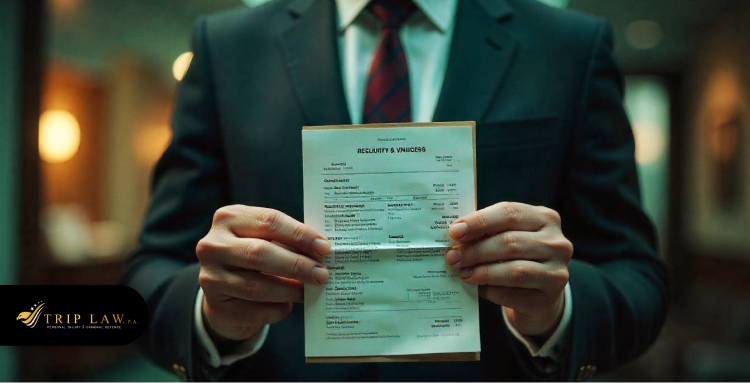
Blogs
January 26, 2025
What to Expect After Theft by Taking Felony Conviction

Life has a way of surprising us with its harsh truths, often at the most inconvenient times. Imagine, for a moment, finding yourself on the wrong side of the law, convicted of felony theft. It's a sobering reality that many don't see coming. The consequences that follow are as real as the very breath we take, and they’ll alter the course of your life in ways you may not expect. Whether it’s the weight of a prison sentence or the quiet effects on your future, the road ahead can seem daunting.
However, it’s important to understand what comes next, so you can navigate this challenging chapter with clarity, rather than fear. Let’s take a closer look at what you can expect after a theft conviction and how you might make sense of it all.
1. What is Theft by Taking Felony Conviction
At its core, theft by taking in Wisconsin is an act that strips someone of their rightful ownership. Under Wisconsin Statutes Section 943.20, theft is defined as intentionally taking or retaining possession of someone else’s property without consent and with the intent to permanently deprive the owner of it. This act demonstrates not just a disregard for personal property but also a breach of trust that society holds dear.
To understand theft by taking it fully, it’s crucial to differentiate it from other theft-related offenses. For example:
Theft by Fraud: This occurs when a person deceives someone to gain possession of their property. Unlike theft by taking, fraud relies on manipulation rather than direct action.
Theft by Concealment: This involves intentionally hiding merchandise to avoid paying for it, often associated with retail theft or shoplifting.
Theft by Embezzlement: This applies when someone lawfully entrusted with funds or property unlawfully converts them for personal use.
2. Felony Theft Classification: What are the Consequences?

In Wisconsin, the line between misdemeanor and felony theft isn’t arbitrary; it’s drawn by the value of the property taken. The more valuable the property, the more severe the charge.
Misdemeanor vs. Felony Theft
Misdemeanor theft typically involves property valued at less than $2,500. It's a charge that, while still serious, often carries lesser penalties. This could mean a fine, a short stint in jail, or probation. However, when the value of the stolen property exceeds a certain threshold, the offense escalates to felony theft, which entails far greater consequences.
Felony Classes in Wisconsin
Wisconsin categorizes felony theft offenses into specific classes, each carrying its own range of penalties. Here’s a breakdown of the major classes:
Class I Felony: This is the least severe of the felony classifications but still a serious charge. A theft of property valued between $2,500 and $5,000 can result in up to 3.5 years of imprisonment (1.5 years in prison plus up to 2 years of extended supervision) and fines reaching $10,000.
Class H Felony: If the value of the stolen property falls between $5,000 and $10,000, the charge becomes a Class H Felony, which carries up to 6 years of imprisonment (3 years of confinement and 3 years of supervision) and the possibility of $10,000 in fines.
Class G Felony: For theft of property valued at over $10,000, the charge jumps to a Class G Felony, which can result in up to 10 years in prison (5 years in confinement plus 5 years of supervision), along with fines up to $25,000.
Class F Felony: The most severe of these classifications involves theft of property valued over $100,000. A Class F Felony carries up to 12.5 years in prison (7.5 years in confinement plus 5 years of supervision) and fines as high as $25,000.
3. Collateral Consequences of a Felony Conviction: Employment, Rights, and Stigma
While the legal penalties are immediate and clear, the collateral consequences often linger long after the sentence is served, affecting one’s ability to rebuild and move forward. These consequences, though less visible, are no less impactful.
Employment Challenges
In Wisconsin, like in many states, employers often conduct background checks to assess the character and history of potential employees. A felony conviction in Wisconsin can significantly limit job prospects, especially in fields that require high levels of trust or security clearance.
Professional licenses—whether in healthcare, law, finance, or other fields—are often withheld from individuals with felony convictions. This can be devastating for those whose careers depend on maintaining these certifications.
Civil Rights Restrictions
A felony conviction also leads to certain civil rights restrictions, which can drastically alter one’s relationship with society. In Wisconsin, felons lose the right to vote until they have fully completed their sentence, including any parole or probation. For many, this is a disheartening consequence, as it removes their ability to participate in civic duties during a critical time in their life.
Additionally, felons face firearm ownership prohibitions. Under both Wisconsin and federal law, individuals convicted of felony theft are barred from purchasing or possessing firearms. This restriction can impact not only personal safety but also one’s ability to engage in activities such as hunting or owning firearms for protection.
Social Stigma
Beyond the legal restrictions, perhaps the most pervasive consequence of a felony conviction is the social stigma it carries. A felony conviction doesn’t just affect how the law sees you—it affects how your community, friends, and family do as well. The weight of being labeled a “felon” often comes with a heavy dose of societal judgment, which can strain personal relationships and diminish one’s standing in the community.
4. Let Milwaukee Legal Pros Help You Build a Defense That Stands Strong

When facing a felony theft charge in Wisconsin, it’s essential to understand that the outcome of your case is not determined solely by the facts at hand—it is shaped by the defense strategies available and the strength of your legal representation. These strategies aim not only to weaken the prosecution's case but also to raise reasonable doubt in the minds of the jury or judge.
Claim of Ownership
One of the most straightforward defenses in a theft case is the claim of ownership. If the defendant can prove that the property in question rightfully belonged to them, the charge of theft evaporates. This defense is often used when there is confusion about the property’s rightful owner or when the defendant took property mistakenly or without malicious intent. Demonstrating ownership can be as simple as presenting receipts, testimony, or any other evidence that proves the individual’s right to the property.Lack of Intent
Theft, particularly theft by taking, requires the intention to permanently deprive the rightful owner of their property. Without this intent, the act may not constitute theft under the law. For example, if the defendant took an item by mistake, or if they intended only to borrow it, we could argue that the necessary mental state for theft was not present. Lack of intent is often used as a defense in cases involving misunderstandings, miscommunications, or accidental actions.Entrapment
Entrapment occurs when law enforcement officials coerce or induce an individual to commit a crime that they would not have otherwise committed. If a defendant can show that they were tricked or manipulated into committing theft by an undercover officer or an informant, they may be able to raise an entrapment defense. This is a delicate and complex strategy, as it requires proving that law enforcement went beyond mere encouragement and actively initiated the crime.False Allegations
False accusations are, unfortunately, not uncommon in theft cases. In some instances, individuals are wrongly accused of stealing due to personal vendettas, misunderstandings, or even mistaken identity. In these cases, Milwaukee legal pros will work to discredit the accusations, providing evidence or presenting testimony that proves the defendant did not commit the alleged crime. Whether through alibi evidence, witness testimony, or inconsistencies in the accuser's story, this defense seeks to eliminate the possibility that the defendant was involved in the crime.
Contact us today for a free consultation. We can assess your situation, explain your options, and fight tirelessly to protect your rights and achieve the best possible outcome for your case.
Our Latest News













At Trip Law we set out to create a unique law firm where outstanding immigration representation and a deep commitment to humanity go hand in hand. Hardam H. Tripathi was a former legal professional in the federal government.
